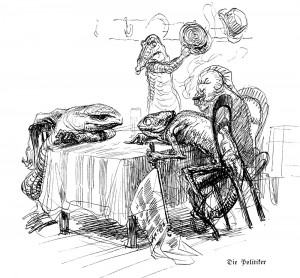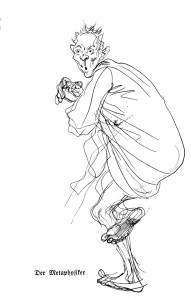by Henry Farrell on April 10, 2013
Via The Browser a rather wonderful unravelling of the various identities associated with independent scholar A.D. Harvey, who apparently leaves posers like John Lott spluttering in the dirt. The piece is long but worthwhile: at its best, it reads like a combination of A.J. Symon’s _Quest for Corvo_ and what _At-Swim-Two-Birds_ might have been if Flann O’Brien were a tenured professor of history:
bq. Even for holders of tenured university positions, scholarship can make for a lonely life. One spends years on a monograph and then waits a few more years for someone to write about it. How much lonelier the life of an independent scholar, who does not have regular contact, aggravating as that can sometimes be, with colleagues. Attacking one’s own book can be seen as an understandable response to an at times intolerable isolation. How comforting to construct a community of scholars who can analyse, supplement and occasionally even ruthlessly criticize each other’s work. I’ve traced the connections between A. D. Harvey, Stephanie Harvey, Graham Headley, Trevor McGovern, John Schellenberger, Leo Bellingham, Michael Lindsay and Ludovico Parra, but they may be part of a much wider circle of friends. … some of Harvey’s own mystifications leave an unpleasant taste. It is not only that the apparent practice of submitting articles under fictitious names to scholarly journals might well have a chilling effect on the ability of really existing independent scholars to place their work. Nor is it just the embarrassment caused to editors who might in an ideal world have taken more pains to check the contributions of Stephanie Harvey or Trevor McGovern, but who accepted them in good faith, partly out of a wish to make their publications as inclusive as possible.
by Chris Bertram on April 10, 2013
The 1970s have been in my mind over the past few days, not only for the obvious reason, but also because I visited the Glam exhibition at Tate Liverpool last weekend. Not only were the seventies the final decade of an electrical-chemical epoch that stretched back to the late nineteenth-century, they were also the time when the sexual and political experimentation of the 1960s and a sense of being part of a cosmopolitan world order became something for the masses, for the working class, and when the old social order started to dissolve. In the experience of many people, the sixties happened in the seventies, as it were.
But my main thoughts, concerning Britain at any rate, have been about social division, and about some oddly paradoxical features of British life before Thatcher. There’s a very real sense in which postwar British society was very sharply divided. On the one hand, it was possible to be born in an NHS hospital, to grow up on a council estate, to attend a state school, to work in a nationalised industry and, eventually (people hoped), to retire on a decent state pension, living entirely within a socialised system co-managed by the state and a powerful Labour movement. On the other, there were people who shared the experience of the NHS but with whom the commonality stopped there: they were privately educated, lived in an owner-occupied house and worked in the private sector. These were two alternate moral universes governed by their own sets of assumptions and inhabited by people with quite different outlooks. Both were powerful disciplinary orders. The working class society had one set of assumptions – welfarist, communitarian, but strongly gendered and somewhat intolerant of sexual “deviance”; middle-class society had another, expressed at public (that is, private) schools through institutions like compulsory Anglican chapel. Inside the private-sector world, at least, there was a powerful sense of resentment towards Labour, expressed in slogans about “managers right to manage” and so on that later found expression in some of the sadism of the Thatcher era towards the working-class communities that were being destroyed. Present too, at least in the more paranoid ramblings of those who contemplated coups against Labour, was the idea that that the parallel socialised order represented a kind of incipient Soviet alternative-in-waiting that might one day swallow them up.
[click to continue…]
by John Holbo on April 10, 2013
I was going to review a couple of new books I picked up – The Lost Art of Heinrich Kley, Volume 1: Drawings & Volume 2: Paintings & Sketches
& Volume 2: Paintings & Sketches . (Those are Amazon links. You can get it a bit cheaper from the publisher. And see a nifty little video while you’re there.) But now I seem to have lost vol. 1 of Lost Art. Turned the house over, top to bottom. Can’t find it anywhere! Oh, well. Bottom line: I’ve been collecting old Kley books for a while. It’s fantastic stuff – if you like this kind of stuff – and these new books contain a wealth of material I had never seen. I wish, I wish the print quality in vol. 1 were higher because the linework really needs to pop. The color stuff in volume 2 is better, and harder to come by before now. One editorial slip. Kley’s Virgil illustrations come from a ‘travestiert’ Aeneid, by Alois Blumauer, not a ‘translated’ one. Parody stuff. (There, I just had to get my drop of picky, picky pedantry in there.) That said, the editorial matter in both volumes is extremely interesting. Volume 2 has a great Intro by Alexander Kunkel and a very discerning little Appreciation by Jesse Hamm, full of shrewd speculations about Kley’s methods. He’s a bit of a mystery, Kley is.
. (Those are Amazon links. You can get it a bit cheaper from the publisher. And see a nifty little video while you’re there.) But now I seem to have lost vol. 1 of Lost Art. Turned the house over, top to bottom. Can’t find it anywhere! Oh, well. Bottom line: I’ve been collecting old Kley books for a while. It’s fantastic stuff – if you like this kind of stuff – and these new books contain a wealth of material I had never seen. I wish, I wish the print quality in vol. 1 were higher because the linework really needs to pop. The color stuff in volume 2 is better, and harder to come by before now. One editorial slip. Kley’s Virgil illustrations come from a ‘travestiert’ Aeneid, by Alois Blumauer, not a ‘translated’ one. Parody stuff. (There, I just had to get my drop of picky, picky pedantry in there.) That said, the editorial matter in both volumes is extremely interesting. Volume 2 has a great Intro by Alexander Kunkel and a very discerning little Appreciation by Jesse Hamm, full of shrewd speculations about Kley’s methods. He’s a bit of a mystery, Kley is.
The books are in a Lost Art series that is clearly a labor of love for Joseph Procopio, the editor.
In honor of our Real Utopias event, I’ll just give you Kley on politics and metaphysics. (These particular images aren’t from these new volumes, but they’re nice, aren’t they?)


Click for larger.

